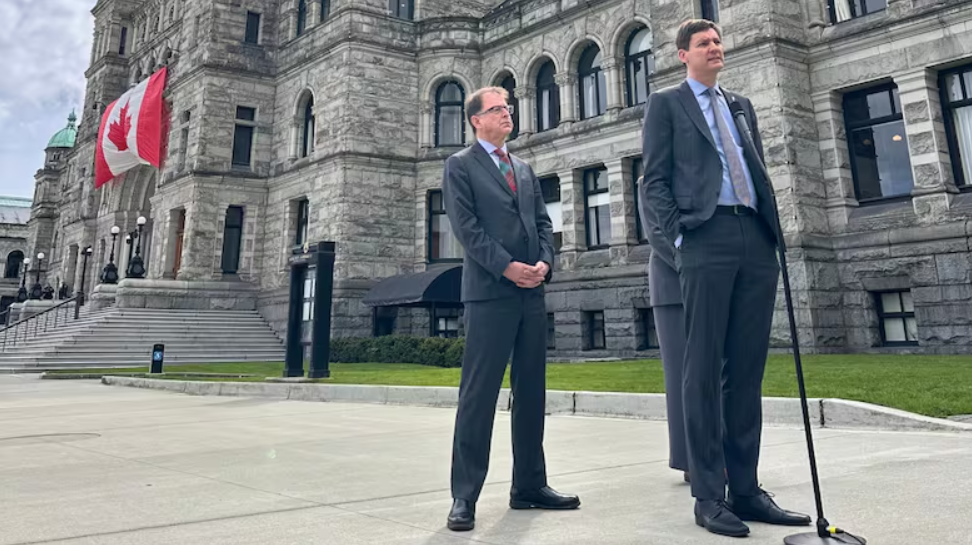B.C. Scraps Consumer Carbon Tax, But Leaves Questions on Gas Prices and Climate Policy
Noah Chen
4/1/20253 min read


After 17 years, British Columbia's consumer carbon tax is officially over — but Premier David Eby and his government are offering few concrete details on what comes next.
With a federal waiver in hand and political pressure mounting, the province fast-tracked legislation Monday night to scrap the carbon tax at the consumer level. The bill passed around 1:30 a.m. Tuesday, just days before a scheduled April 1 increase.
“The policy has run its course,” Eby said. “British Columbians don’t support it. They don’t want it. We listen to the people.”
Eby, who previously supported the tax, admitted its political toxicity became too much to ignore.
“I support the policy. I thought it was a good policy. I fought for the policy,” he said. “But without a doubt, the policy became absolutely toxic with British Columbians.”
Immediate savings — or just a price shift?
The government says motorists will see a drop of 17.61 cents per litre at the pump — the amount formerly charged as the consumer carbon tax.
But Eby also acknowledged that prices could simply rise again if oil companies adjust rates accordingly.
“A little heads-up to the oil and gas companies: now is not the time to be playing games,” he warned, saying existing regulations require companies to report price changes to the B.C. Utilities Commission.
Even with that oversight, many observers are skeptical of whether savings will be passed on to consumers.
$1.5 billion budget gap and fewer supports for low-income families
Beyond prices at the pump, the tax’s removal creates a significant hole in B.C.’s newly released budget — an estimated $1.5 billion that the government had previously accounted for.
When asked whether the province would raise other taxes to cover the loss, Eby said no.
“We are not going to be increasing taxes to make up the difference,” he said, instead promising a broad review of government programs “to ensure we’re delivering as efficiently as possible.”
One clear casualty is the Climate Action Tax Credit, a quarterly payment that helped offset the carbon tax for lower-income residents — and often provided more money than the tax itself cost them.
That payment, Eby confirmed, is now gone.
“This is significant for many British Columbians,” he said. “And that payment will not be happening anymore.”
Climate credibility in question
The consumer carbon tax was once considered a gold standard in climate policy — introduced by the B.C. Liberals in 2008 and upheld by successive governments as a market-driven way to reduce emissions.
Eby insists B.C. will still lead on climate through its industrial carbon tax and changes to the CleanBC program, though he provided few details.
“It’s going to be a reality-based policy around fighting climate change in a way that grows our economy and supports British Columbians with the cost of daily life,” he said.
Still, environmentalists and experts are raising concerns.
University of B.C. political science professor Kathryn Harrison noted that B.C.'s consumer carbon tax was one of the few examples in Canada where a price signal appeared to reduce emissions.
“By my count, about 15 studies found that the carbon price was effective in reducing emissions below what they would otherwise be,” she said.
While B.C.’s overall greenhouse gas emissions remained largely flat between 2007 and 2022 — 65.5 million tonnes to 65.6 million tonnes — Harrison said higher carbon prices would have been necessary to create absolute reductions.
Political calculus over climate legacy
With a federal election looming and trade tensions with the U.S. dominating headlines, Eby’s NDP government is framing the repeal as a matter of economic necessity — and political survival.
The opposition B.C. Conservatives, who have been vocally against the tax, used debate time to highlight the government’s reversal, while the Green Party questioned the speed and transparency of the decision.
Despite its sudden end, the carbon tax’s legacy is likely to remain a point of debate — between those who see it as a landmark climate tool, and those who see it as politically unsustainable in the face of rising costs and public opposition.
For now, B.C.’s climate path forward remains unclear — as does the final price British Columbians will pay at the pump, and in the broader climate fight.
News
Stay updated with the latest BC news stories, subscribe to our newsletter today.
SUBSCRIBE
© 2025 Innovatory Labs Inc.. All rights reserved.
LINKS
